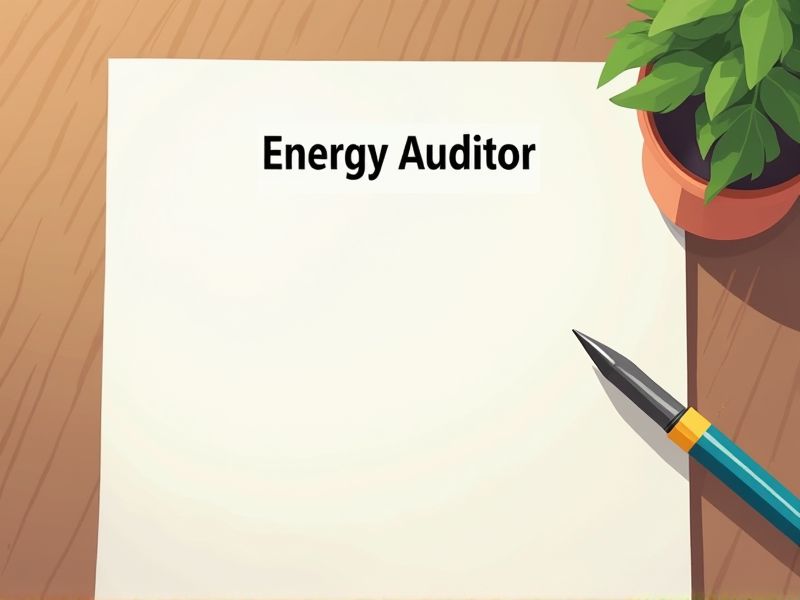
Energy auditors assess energy use in buildings and recommend ways to enhance efficiency, which directly impacts energy consumption and cost savings. Their recommendations are often technical and require knowledge of industry standards, making certifications crucial for credibility and expertise. Certifications validate skills, ensuring auditors can accurately interpret data, analyze energy systems, and propose effective solutions. Essential certifications for an energy auditor include building analyst, commercial energy auditor, and building performance certifications.
Certified Energy Manager (CEM)
Possessing a Certified Energy Manager (CEM) qualification enhances an Energy Auditor's ability to effectively assess and manage energy performance in buildings and industries. CEM certification equips auditors with in-depth knowledge of energy systems, enabling precise identification of inefficiencies and areas for improvement. Energy Auditors with CEM credentials are trusted to implement energy-saving strategies, ensuring compliance with industry standards and government regulations. Businesses and institutions seeking to reduce operational costs and carbon footprints often prefer Energy Auditors with CEM qualifications due to proven expertise in optimizing energy use.
Certified Energy Auditor (CEA)
A Certified Energy Auditor (CEA) is crucial as they possess the specialized knowledge to accurately assess the energy efficiency of buildings. By identifying areas where energy consumption can be reduced, they help organizations lower their utility costs. CEAs are also equipped to recommend and implement effective energy-saving measures that can enhance sustainability efforts. This certification ensures that energy audits adhere to industry standards, thus increasing credibility and reliability in energy management practices.
Certified Measurement and Verification Professional (CMVP)
Certified Measurement and Verification Professionals (CMVP) are needed for energy auditors to ensure accurate assessment of energy savings, which builds credibility for energy conservation measures. CMVP certification equips auditors with standardized methodologies, enhancing their ability to quantify performance and identify inefficiencies. With precise measurement and verification, energy projects can secure funding and stakeholder trust by demonstrating return on investment. CMVPs help validate energy conservation claims, mitigating the risk of project failure and maximizing sustainability outcomes.
LEED Accredited Professional (LEED AP)
Energy auditors with a LEED Accredited Professional (LEED AP) certification gain a comprehensive understanding of sustainable building practices, which enhances their ability to assess and recommend energy-efficient improvements. With LEED AP credentials, they can better navigate green building standards to offer solutions that align with industry best practices. Their expertise in LEED criteria facilitates collaboration with project teams aiming for LEED certification, increasing project value. The integration of sustainable practices advocated by LEED can lead to substantial energy reductions in audited properties.
Building Analyst Certification (BPI)
The Building Analyst Certification (BPI) equips energy auditors with standardized skills and knowledge crucial for assessing energy efficiency in buildings. By achieving this certification, auditors can offer more accurate and comprehensive evaluations, leading to more effective energy-saving recommendations. Certified energy auditors often gain a competitive edge in the market, reflecting increased credibility and trustworthiness. This results in better alignment with evolving industry standards and regulatory requirements, ensuring compliance and relevance in their professional practice.
ISO 50001 Energy Management Systems Lead Auditor
An ISO 50001 Energy Management Systems Lead Auditor provides a structured framework for systematically improving energy performance, which enhances an energy auditor's capability to assess efficiency measures. By ensuring an organization's compliance with international energy standards, the lead auditor identifies discrepancies and potential areas for energy savings. This role enhances credibility and demonstrates a commitment to sustainable practices, making the findings and recommendations more impactful for stakeholders. The lead auditor's involvement facilitates continuous improvement processes, driving organizations toward achieving long-term energy efficiency goals.
Professional Energy Manager (PEM)
Energy auditors rely on Professional Energy Managers (PEM) to ensure accurate identification of energy-saving opportunities, as PEMs possess specialized knowledge in energy systems. This expertise allows for the development of comprehensive energy efficiency strategies, directly improving audit outcomes. PEMs also play a crucial role in interpreting technical data, which aids in the formulation of cost-effective solutions. Their involvement further ensures adherence to regulatory standards and best practices, enhancing the credibility and effectiveness of energy audits.
Energy Risk Professional (ERP)
The demand for an Energy Risk Professional (ERP) arises from the increasing complexity and volatility of global energy markets, necessitating specialized risk management skills. An energy auditor with ERP expertise can more effectively identify and mitigate financial and operational risks associated with energy consumption and procurement. Regulatory compliance becomes more manageable for energy auditors when guided by an ERP, as they're fluent in understanding energy policies and market dynamics. The integration of ERP skills enables energy auditors to deliver comprehensive energy management strategies, optimizing both performance and cost-efficiency.
HERS Rater Certification
Obtaining a HERS Rater Certification ensures that an energy auditor is knowledgeable about the Home Energy Rating System and can accurately assess a home's energy efficiency. This certification enables the auditor to provide validated energy performance scores, crucial for meeting regulatory standards and energy efficiency programs. It enhances the credibility of the energy auditor, instilling trust among clients seeking reliable assessments for energy optimization. Certified HERS Raters can contribute to more effective energy-saving strategies, leading to long-term benefits in cost savings and environmental impact.
Residential Energy Auditor (REA)
Energy consumption often accounts for a significant portion of a household's expenses, and a Residential Energy Auditor helps identify inefficiencies. Detecting areas of energy waste, such as poor insulation or outdated appliances, allows for targeted improvements, reducing costs. The assessment from a Residential Energy Auditor provides actionable insights that enhance home comfort and contribute to sustainability. Energy audits often result in increased property value due to energy-efficient upgrades and certifications.
Summary
As an energy auditor gains certifications, you can expect their credibility in the industry to increase, enhancing trust among clients. Certifications often lead to better job opportunities, potentially resulting in higher salary offers. You may notice improved auditing skills and deeper insights into energy efficiency solutions. The marketability of certified energy auditors tends to rise, expanding client networks and business prospects.
